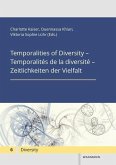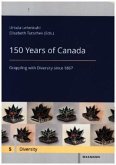How do diversity and memory mutually shape one another? This volume of the IRTG Diversity Series shows that a focus on memory introduces an important and contested temporal dimension to the politics, practices, and narratives of diversity. Exploring the various entanglements of historical projections and representations of and from the past with contemporary discourses on difference and inclusion, the articles in this collection problematize memory in relationship to three (often overlapping) modes of storytelling: literature, ethno-biography, and historiography. From the construction of diasporic identities to family migration histories to the conflicted politics of remembering, memories shape diversity, be they in the form of shared memories, divided memories, or conflicting memories.
Bitte wählen Sie Ihr Anliegen aus.
Rechnungen
Retourenschein anfordern
Bestellstatus
Storno








